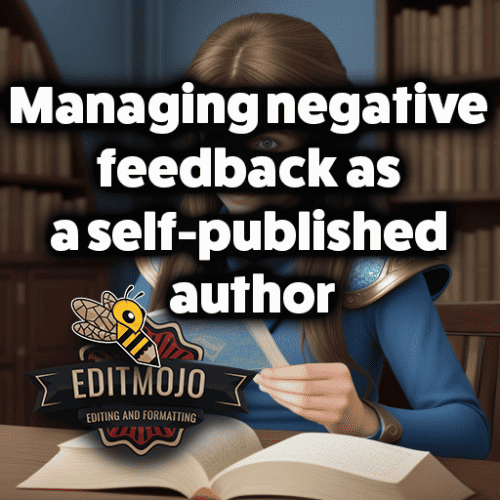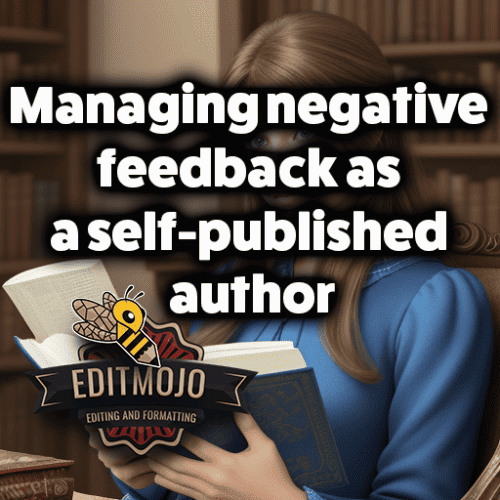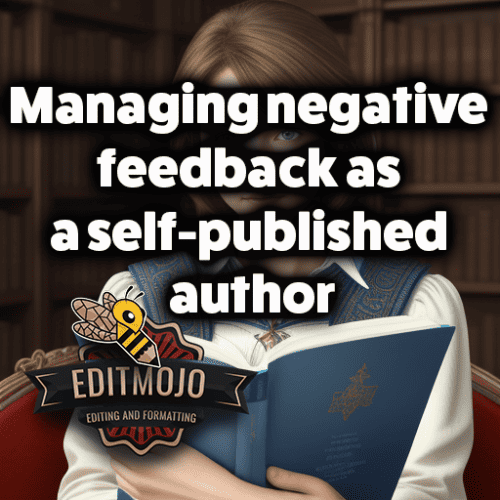Managing negative feedback as a self-published author
Managing negative feedback as a self-published author. As a writer, putting your work out there for the world to see is a brave endeavor. Especially in the world of self-publishing, your book is a reflection of your creative imagination, hard work, and dedication. An essential part of this process is feedback. While positive feedback can be encouraging and rewarding, negative feedback can be difficult to deal with. But fear not, because the secret to growth lies in mastering the art of handling criticism.
Key Takeaways Table
| Takeaway Points | Description |
|---|---|
| Understand Negative Feedback | It’s crucial to understand that negative feedback comes in different forms and can provide useful insights for improvement. |
| Importance of Negative Feedback | Negative feedback, when constructive, can be an opportunity for growth, helping authors refine their work. |
| Preparation for Negative Feedback | Develop a growth mindset and understand that criticism is an inevitable part of the creative process. |
| Analysis and Action | Learn to differentiate between constructive and destructive feedback and use it to create an action plan for improvement. |
| Emotional Impact Management | Develop techniques to manage stress associated with negative feedback, such as mindfulness, seeking peer support, or professional help. |
| Audience Relationship | Building a healthy author-reader relationship can enhance understanding of the audience and make them feel valued. |
| Dealing with Trolls | Distinguish between genuine negative feedback and troll comments, protecting your mental health by reporting malicious content. |
Understanding Negative Feedback
Negative feedback is an opinion about your work that highlights flaws, mistakes, or areas of improvement. It can come in the form of a critique from a reader, a bad review on Amazon, or even a disheartening comment on your blog. Dealing with such feedback can be emotionally challenging, often leading to feelings of doubt and disappointment. But remember, no writer is beyond criticism, and handling feedback effectively is an art that can be honed.
Importance of Negative Feedback
Negative feedback, though often perceived as disheartening, plays a vital role in a writer’s journey. It provides a new perspective, offering insights that you might have overlooked. Think of J.K. Rowling, who faced multiple rejections before ‘Harry Potter’ became a global phenomenon. It was the feedback from these rejections that helped her refine the narrative, and ultimately create a story loved by millions. So, remember that negative feedback is an opportunity, not an obstacle.

How to Prepare Yourself for Negative Feedback
Bracing yourself for negative feedback is crucial in maintaining emotional balance. Start by cultivating a growth mindset. See your writing skills as a craft that can be honed and developed. Don’t take feedback personally – remember, it’s your work that’s being critiqued, not you as an individual. Understand that negative feedback is inevitable; even the most successful authors have faced harsh criticism.
How to Analyze Negative Feedback
Not all negative feedback is equal. There’s constructive criticism that’s meant to help you improve, and then there’s destructive criticism that offers no value. Learning to differentiate between these is crucial. Constructive feedback usually offers specific points about your writing, such as pacing, character development, or plot points. On the other hand, destructive criticism often involves personal attacks, vague comments, or unjust criticism. Use constructive criticism to identify weak points in your writing and seek ways to improve them.
Turning Negative Feedback into Constructive Action
Having analyzed the feedback, it’s time to turn it into constructive action. Draw up an action plan based on the criticism. If the feedback is about weak character development, invest time in understanding your characters better. If it’s about pacing, learn about different pacing techniques and experiment with them. Remember, incorporating feedback doesn’t mean losing your personal style or creative vision. It’s about refining it and making it more palatable for your readers.

Managing the Emotional Impact of Negative Feedback
Dealing with negative feedback can take a toll on your emotional wellbeing. Therefore, it’s crucial to have strategies to handle the emotional impact. Mindfulness and meditation can be incredibly helpful in managing stress. Join a writing community or seek support from fellow authors, as they can empathize with your situation. If you find it hard to cope, don’t hesitate to seek professional help.
Building a Healthy Relationship with Your Audience
Engaging with your readers and building a strong author-reader relationship is vital. Not only does it help you understand their perspective better, but it also makes them feel valued. Be transparent and
honest in your communication. Emphasize that you appreciate feedback and are keen on improving. Remember, your audience’s feedback can be instrumental in creating successful work.
Bad Feedback vs. Trolls
In the digital world, we often encounter internet trolls who leave negative comments or reviews just for the sake of it. Distinguishing between bad feedback and troll comments is important. If a comment is defamatory or malicious, consider reporting it to the platform. Remember, you have the right to protect your mental health and to create in a safe space.
Conclusion (Managing negative feedback as a self-published author)
In the world of self-publishing, managing negative feedback can be a challenging yet rewarding journey. Embrace it as a stepping stone to success, not an obstacle. Keep honing your craft, keep engaging with your audience, and most importantly, keep writing. Remember, every piece of feedback brings you one step closer to becoming a better writer. So, here’s a call to action for all self-published authors – take feedback in stride, turn it into constructive action, and keep shining.

Resources (Managing negative feedback as a self-published author)
To further your understanding, here are some resources that might help:
- Books and articles: Thanks for the Feedback by Douglas Stone and Sheila Heen, Emotional Agility by Susan David.
- Self-help resources: The Mindful Self-Compassion Workbook by Kristin Neff.
- Writing workshops and courses: MasterClass offers a variety of writing courses by established authors.
Remember, negative feedback is not the end but a beginning to a better writing journey!
Top Five Questions and Answers Table
| Questions | Answers |
|---|---|
| What is negative feedback? | Negative feedback is an opinion that highlights the flaws or areas of improvement in your work. |
| Why is negative feedback important? | It provides new perspectives and insights that you might have overlooked, helping to refine your work. |
| How should one prepare for negative feedback? | Cultivating a growth mindset and understanding that criticism is an inevitable part of the writing process is crucial. |
| How can negative feedback be turned into constructive action? | Analyze the feedback, identify the weak points in your work, and use this information to create an action plan for improvement. |
| How to deal with trolls? | Distinguish between genuine feedback and troll comments, reporting malicious content to the platform if needed. |
Top Ten Resources for Further Reading Table
| Resources | Keywords |
|---|---|
| Thanks for the Feedback | Feedback, Criticism, Personal Growth |
| Emotional Agility | Emotional Health, Self-Improvement |
| The Mindful Self-Compassion Workbook | Mindfulness, Self-compassion |
| MasterClass | Writing Courses, Author Guidance |
| Coursera: Writing in the Sciences | Writing Skills, Science Writing |
| Psychology Today: Dealing with Criticism | Handling Criticism, Emotional Wellbeing |
| Writer’s Digest: Dealing with Criticism | Writing Critiques, Author Tips |
| Harvard Business Review: The Right Way to Respond to Negative Feedback | Responding to Feedback, Professional Growth |
| Grammarly Blog: How to Handle Negative Feedback | Handling Negative Feedback, Writing Tips |
| Inklyo: How to Deal with Negative Reviews | Negative Reviews, Self-Publishing |
